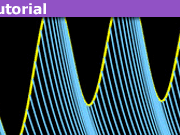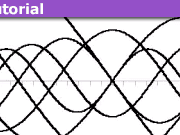Explore the Fascinating Sums of Odd Powers of 1/n
The goal is to get a little bit closer to the values of the zeta function (ζ(s)) and the eta function (η(s)) for some odd values of s. This insight is an expansion of two of my previous insights (Further Sums Found Through Fourier Series, Using the Fourier Series To Find Some Interesting Sums). You patience is appreciated as there are many equations to load on this page.
Specifically I will calculate the sums
- [itex]\frac{1}{1^{p}}-\frac{1}{3^{p}} +\frac{1}{5^{p}}-\frac{1}{7^{p}}… [/itex]
- [itex]\frac{1}{1^{p}}+\frac{1}{2^{p}}-\frac{1}{4^{p}} -\frac{1}{5^{p}}+\frac{1}{7^{p}}…[/itex]
- [itex]\frac{1}{1^{p}}+\frac{1}{2^{p}}+\frac{1}{3^{p}} -\frac{1}{5^{p}}-\frac{1}{6^{p}}-\frac{1}{7^{p}}…[/itex]
- [itex]\frac{1}{1^{p}}+\frac{1}{2^{p}}+\frac{1}{3^{p}}+\frac{1}{4^{p}} +\frac{1}{5^{p}}-\frac{1}{7^{p}}-\frac{1}{8^{p}}… [/itex]
for p = 3, 5, 7 and 9. The method works just as well if p is an odd integer >9, but the numbers used in the arithmetic get very unwieldy.
Table of Contents
Remark
In this insight, the fact that [itex]e^{i\pi}=-1=e^{-i\pi} [/itex] is going to be used repeatedly without any explanation.
Lemma 1
Let [itex]g(x)=e^{ikx}x^{2m} [/itex] where k and m are integers. Then [itex]g(\pi)-g(-\pi)=0[/itex].
Proof:
[itex]g(\pi)-g(-\pi)=(-1)^{k}\pi^{2m}-(-1)^{k}(-\pi)^{2m}=(-1)^{k}((\pi^{2})^{m}-((-\pi)^{2})^{m}=0 [/itex]
Lemma 2
Let [itex]g(x)=e^{ikx}\sum_{m=1}^{N}a_{m}x^{2m} [/itex] where N is a finite integer (and k and m are integers). Then [itex]g(\pi)-g(-\pi)=0[/itex].
Proof:
Repeated application of Lemma 1.
Lemma 3
Let p be an odd integer (p=2n+1). Then there exists a polynomial h(x) such that
- [itex]h(\pi)-h(-\pi)=0 [/itex]
- [itex]h'(\pi)-h'(-\pi)=0 [/itex]
- [itex]h^{(q)}(\pi)-h^{(q)}(-\pi)=0[/itex] for all q-derivatives of h where q<p.
Proof
Let [itex]h(x)=a_{1}\pi^{p-1}x+a_{3}\pi^{p-3}x^{3}+…-x^{p} [/itex] (only odd powers of x). Our requirements give the following set of equations:
- [itex]a_{1}+a_{3}+…=1 [/itex]
- [itex]6a_{3}+20a_{5}+…=p(p-1) [/itex]
- …
This ends up in neat solutions for all [itex]a_{k}[/itex]. Observe that the odd derivatives of h(x) are sums of even powers of x and Lemma 2 assures that the corresponding equations are satisfied.
Actual values for h(x):
- [itex]h_{3}(x)=-x^{3}+\pi^{2}x [/itex]
- [itex]h_{5}(x)=-x^{5}+\frac{10\pi^{2}}{3}x^{3}-\frac{7\pi^{4}}{3}[/itex]
- [itex]h_{7}(x)=-x^{7}+7\pi^{2}x^{5}-\frac{49\pi^{4}}{3}x^{3}+\frac{31\pi^{6}}{3} [/itex]
- [itex]h_{9}(x)=-x^{9}+12\pi^{2}x^{7}-\frac{294\pi^{4}}{5}x^{5}+124\pi^{6}x^{3}-\frac{381\pi^{8}}{5}x [/itex]
Lemma 4
Let h(x) be as in Lemma 3. Then the Fourier transform coefficients of h(x) is given by [itex]a_{0}=0; a_{n}=(-1)^{n}\frac{p!}{(in)^{p}} [/itex].
Thus we have [itex]h(x)=\sum_{n=-\infty}^{-1}\frac{(-1)^{n}p!}{(in)^{p}}e^{inx}+\sum_{n=1}^{\infty}\frac{(-1)^{n}p!}{(in)^{p}}e^{inx} [/itex]. Combine the two sums: [itex]h(x)=\frac{p!}{i^{p}}\sum_{1}^{\infty}(-1)^{n}\frac{(e^{inx}-e^{-inx})}{n^{p}}=(-1)^{\frac{p+1}{2}}p!\sum_{1}^{\infty}\frac{(e^{in(\pi-x)}-e^{-in(\pi-x)})}{n^{p}}=(-1)^{\frac{p+1}{2}}\cdot 2\cdot p!\sum_{n=1}^{\infty}\frac{\sin(n(\pi – x))}{n^{p}} [/itex].
1. Values for x=π/2
The values of the sums in this chapter are:
- [itex]\sum_{n=0}^{\infty}\frac{(-1)^{n}}{(2n+1)^{3}}=\frac{\pi^{3}}{32} [/itex]
- [itex]\sum_{n=0}^{\infty}\frac{(-1)^{n}}{(2n+1)^{5}}=\frac{5\pi^{5}}{1536} [/itex]
- [itex]\sum_{n=0}^{\infty}\frac{(-1)^{n}}{(2n+1)^{7}}=\frac{61\pi^{7}}{184320} [/itex]
- [itex]\sum_{n=0}^{\infty}\frac{(-1)^{n}}{(2n+1)^{9}}=\frac{277\pi^{9}}{8257536} [/itex]
Proofs
The values for [itex]\sin(\frac{n\pi}{2}) [/itex] are (1, 0, -1, 0). Also [itex]\pi-\frac{\pi}{2}=\frac{\pi}{2} [/itex]. Thus:
- [itex]h_{3}(\frac{\pi}{2})=\frac{3}{8}\pi^{3}=12\sum_{n=0}^{\infty}\frac{(-1)^{n}}{(2n+1)^{3}} [/itex], thus [itex]\sum_{n=0}^{\infty}\frac{(-1)^{n}}{(2n+1)^{3}}=\frac{\pi^{3}}{32} [/itex]
- [itex]h_{5}(\frac{\pi}{2})=\frac{-25}{32}\pi^{5}=-240\sum_{n=0}^{\infty}\frac{(-1)^{n}}{(2n+1)^{5}} [/itex], thus [itex]\sum_{n=0}^{\infty}\frac{(-1)^{n}}{(2n+1)^{5}}=\frac{5\pi^{5}}{1536} [/itex]
- [itex]h_{7}(\frac{\pi}{2})=\frac{427}{128}\pi^{7}=10080\sum_{n=0}^{\infty}\frac{(-1)^{n}}{(2n+1)^{7}} [/itex], thus [itex]\sum_{n=0}^{\infty}\frac{(-1)^{n}}{(2n+1)^{7}}=\frac{61\pi^{7}}{184320} [/itex]
- [itex]h_{9}(\frac{\pi}{2})=\frac{-12465}{512}\pi^{9}=-72560\sum_{n=0}^{\infty}\frac{(-1)^{n}}{(2n+1)^{9}} [/itex], thus [itex]\sum_{n=0}^{\infty}\frac{(-1)^{n}}{(2n+1)^{9}}=\frac{277\pi^{9}}{8257536} [/itex]
2. Values for x=2π/3
The values of the sums in this chapter are:
- [itex]\sum_{n=0}^{\infty}(-1)^{n}(\frac{1}{(3n+1)^{3}}+\frac{1}{(3n+2)^{3}})=\frac{5\sqrt{3}}{243}\pi^{3} [/itex]
- [itex]\sum_{n=0}^{\infty}(-1)^{n}(\frac{1}{(3n+1)^{5}}+\frac{1}{(3n+2)^{5}})=\frac{17\sqrt{3}}{8748}\pi^{5} [/itex]
- [itex]\sum_{n=0}^{\infty}(-1)^{n}(\frac{1}{(3n+1)^{7}}+\frac{1}{(3n+2)^{7}})=\frac{91\sqrt{3}}{472392}\pi^{7} [/itex]
- [itex]\sum_{n=0}^{\infty}(-1)^{n}(\frac{1}{(3n+1)^{9}}+\frac{1}{(3n+2)^{9}})=\frac{207913\sqrt{3}}{10713850560}\pi^{9} [/itex]
Proofs
The values for [itex]\sin(\frac{n\pi}{3}) [/itex] are ([itex]\frac{\sqrt{3}}{2},\frac{\sqrt{3}}{2}, 0, -\frac{\sqrt{3}}{2}, -\frac{\sqrt{3}}{2}, 0 [/itex]). Also [itex]\pi-\frac{\pi}{3}=\frac{2\pi}{3} [/itex]. Thus:
- [itex]h_{3}(\frac{2\pi}{3})=\frac{10}{27}\pi^{3}=12\sum_{n=0}^{\infty}(-1)^{n}\frac{\sqrt{3}}{2}(\frac{1}{(3n+1)^{3}}+\frac{1}{(3n+2)^{3}})[/itex]. Thus [itex]\sum_{n=0}^{\infty}(-1)^{n}(\frac{1}{(3n+1)^{3}}+\frac{1}{(3n+2)^{3}})=\frac{5\sqrt{3}}{243} [/itex]
- [itex]h_{5}(\frac{2\pi}{3})=\frac{-170}{243}\pi^{5}=-240\sum_{n=0}^{\infty}(-1)^{n}\frac{\sqrt{3}}{2}(\frac{1}{(3n+1)^{5}}+\frac{1}{(3n+2)^{5}}) [/itex]. Thus [itex]\sum_{n=0}^{\infty}(-1)^{n}(\frac{1}{(3n+1)^{5}}+\frac{1}{(3n+2)^{5}})=\frac{17\sqrt{3}}{8748} [/itex]
- [itex]h_{7}(\frac{2\pi}{3})=\frac{6370}{2187}\pi^{7}=10080\sum_{n=0}^{\infty}(-1)^{n}\frac{\sqrt{3}}{2}(\frac{1}{(3n+1)^{7}}+\frac{1}{(3n+2)^{7}}) [/itex]. Thus [itex]\sum_{n=0}^{\infty}(-1)^{n}(\frac{1}{(3n+1)^{7}}+\frac{1}{(3n+2)^{7}})=\frac{91\sqrt{3}}{472392} [/itex]
- [itex]h_{9}(\frac{2\pi}{3})=\frac{-415826}{19683}\pi^{9}=-725760\sum_{n=0}^{\infty}(-1)^{n}\frac{\sqrt{3}}{2}(\frac{1}{(3n+1)^{9}}+\frac{1}{(3n+2)^{9}}) [/itex]. Thus [itex]\sum_{n=0}^{\infty}(-1)^{n}(\frac{1}{(3n+1)^{9}}+\frac{1}{(3n+2)^{9}})=\frac{207913\sqrt{3}}{10713850560}\pi^{9} [/itex]
3. Values for x=3π/4
The values of the sums in this chapter are:
- [itex]\sum_{n=0}^{\infty}(-1)^{n}(\frac{1}{(4n+1)^{3}}+\frac{1}{(4n+2)^{3}}+\frac{1}{(4n+3)^{3}})=\frac{1+6\sqrt{2}}{256}\pi^{3} [/itex]
- [itex]\sum_{n=0}^{\infty}(-1)^{n}(\frac{1}{(4n+1)^{5}}+\frac{1}{(4n+2)^{5}}+\frac{1}{(4n+3)^{5}})=\frac{5+114\sqrt{2}}{49152}\pi^{5} [/itex]
- [itex]\sum_{n=0}^{\infty}(-1)^{n}(\frac{1}{(4n+1)^{7}}+\frac{1}{(4n+2)^{7}}+\frac{1}{(4n+3)^{7}})=\frac{427+38682\sqrt{2}}{165150720}\pi^{7} [/itex]
- [itex]\sum_{n=0}^{\infty}(-1)^{n}(\frac{1}{(4n+1)^{9}}+\frac{1}{(4n+2)^{9}}+\frac{1}{(4n+3)^{9}})=(\frac{277}{4227858432}+\frac{83579\sqrt{2}}{3523215360})\pi^{9} [/itex]
Proofs
The values for [itex]\sin(\frac{n\pi}{4}) [/itex] are ([itex]\frac{\sqrt{2}}{2}, 1, \frac{\sqrt{2}}{2}, 0, -\frac{\sqrt{2}}{2}, -1, -\frac{\sqrt{2}}{2}, 0 [/itex]). Also [itex]\pi-\frac{\pi}{4}=\frac{3\pi}{4} [/itex].
Third powers
[itex]h_{3}(\frac{3\pi}{4})=\frac{21}{64}\pi^{3}=12\sum_{n=0}^{\infty}(-1)^{n}(\frac{\frac{\sqrt{2}}{2}}{(4n+1)^{3}}+\frac{1}{(4n+2)^{3}}+\frac{\frac{\sqrt{2}}{2}}{(4n+3)^{3}}) [/itex]
From (1) we have [itex]h_{3}(\frac{\pi}{2})=\frac{\pi^{3}}{32} [/itex]. It sits in position 2, so we subtract [itex]12\cdot\frac{\pi^{3}}{32\cdot 2^{3}}=\frac{12\pi^{3}}{256} [/itex]: [itex]\frac{21}{64}\pi^{3}-\frac{12\pi^{3}}{256}=\frac{18}{64}\pi^{3} [/itex]. This means that [itex]12\sum_{n=0}^{\infty}(-1)^{n}(\frac{\frac{\sqrt{2}}{2}}{(4n+1)^{3}}+\frac{\frac{\sqrt{2}}{2}}{(4n+3)^{3}})=\frac{18}{64}\pi^{3} [/itex]. Normalize it: [itex]\sum_{n=0}^{\infty}(-1)^{n}(\frac{1}{(4n+1)^{3}}+\frac{1}{(4n+3)^{3}})=\frac{18\sqrt{2}}{768}\pi^{3} [/itex]. Add back the middle element: [itex]\sum_{n=0}^{\infty}(-1)^{n}(\frac{1}{(4n+1)^{3}}+\frac{1}{(4n+2)^{3}}+\frac{1}{(4n+3)^{3}})=\frac{3+18\sqrt{2}}{768}\pi^{3}=\frac{1+6\sqrt{2}}{256}\pi^{3} [/itex].
Fifth powers
[itex]h_{5}(\frac{3\pi}{4})=\frac{-595}{1024}\pi^{5}=-240\sum_{n=0}^{\infty}(-1)^{n}(\frac{\frac{\sqrt{2}}{2}}{(4n+1)^{5}}+\frac{1}{(4n+2)^{5}}+\frac{\frac{\sqrt{2}}{2}}{(4n+3)^{5}}) [/itex]. Change sign: [itex]\frac{595}{1024}\pi^{5}=240\sum_{n=0}^{\infty}(-1)^{n}(\frac{\frac{\sqrt{2}}{2}}{(4n+1)^{5}}+\frac{1}{(4n+2)^{5}}+\frac{\frac{\sqrt{2}}{2}}{(4n+3)^{5}})[/itex] or [itex]\frac{595}{1024\cdot 240}\pi^{5}=\frac{119}{49152}\pi^{5}=\sum_{n=0}^{\infty}(-1)^{n}(\frac{\frac{\sqrt{2}}{2}}{(4n+1)^{5}}+\frac{1}{(4n+2)^{5}}+\frac{\frac{\sqrt{2}}{2}}{(4n+3)^{5}}) [/itex]. From (1) we have [itex]h_{5}(\frac{\pi}{2})=\frac{5\pi^{5}}{1536} [/itex]. It sits in position 2, so we subtract [itex]\frac{5\pi^{5}}{1536\cdot 2^{5}}=\frac{5\pi^{5}}{49152} [/itex]: [itex]\frac{119}{49152}\pi^{5}-\frac{5}{49152}\pi^{5}=\frac{114}{49152}\pi^{5} [/itex]. Normalize it: [itex]\sum_{n=0}^{\infty}(-1)^{n}(\frac{1}{(4n+1)^{5}}+\frac{1}{(4n+3)^{5}})=\frac{19\sqrt{2}}{8192}\pi^{5} [/itex]. Add back the middle element: [itex]\sum_{n=0}^{\infty}(-1)^{n}(\frac{1}{(4n+1)^{5}}+\frac{1}{(4n+2)^{5}}+\frac{1}{(4n+3)^{5}})=\frac{5+114\sqrt{2}}{49152}\pi^{5} [/itex].
Seventh powers
[itex]h_{7}(\frac{3\pi}{4})=\frac{39109}{16384}\pi^{7}=10080\sum_{n=0}^{\infty}(-1)^{n}(\frac{\frac{\sqrt{2}}{2}}{(4n+1)^{7}}+\frac{1}{(4n+2)^{7}}+\frac{\frac{\sqrt{2}}{2}}{(4n+3)^{7}}) [/itex]. From (1) we have [itex]h_{7}(\frac{\pi}{2})=\frac{61\pi^{7}}{184320} [/itex]. It sits in position 2, so we subtract [itex]\frac{10080\cdot 61\pi^{7}}{184320\cdot 2^{7}}[/itex]: [itex]\frac{39109}{16384}\pi^{7}-\frac{61\cdot 10080}{184320\cdot 2^{7}}\pi^{7}=\frac{5631690-614880}{23592960}\pi^{7}=\frac{19341}{8192}\pi^{7} [/itex]. Normalize: [itex]\sum_{n=0}^{\infty}(-1)^{n}(\frac{1}{(4n+1)^{7}}+\frac{1}{(4n+3)^{7}})=\frac{19341\sqrt{2}}{8257360}\pi^{7} [/itex]. Add back the middle element: [itex]\sum_{n=0}^{\infty}(-1)^{n}(\frac{1}{(4n+1)^{7}}+\frac{1}{(4n+2)^{7}}+\frac{1}{(4n+3)^{7}})=\frac{427+38682\sqrt{2}}{165150720}\pi^{7} [/itex].
Ninth powers
[itex]h_{9}(\frac{3\pi}{4})=\frac{-4525731}{262144}\pi^{9}=-725760\sum_{n=0}^{\infty}(-1)^{n}(\frac{\frac{\sqrt{2}}{2}}{(4n+1)^{9}}+\frac{1}{(4n+2)^{9}}+\frac{\frac{\sqrt{2}}{2}}{(4n+3)^{9}}) [/itex]. Change sign: [itex]\frac{4525731}{262144}\pi^{9}=725760\sum_{n=0}^{\infty}(-1)^{n}(\frac{\frac{\sqrt{2}}{2}}{(4n+1)^{9}}+\frac{1}{(4n+2)^{9}}+\frac{\frac{\sqrt{2}}{2}}{(4n+3)^{9}}) [/itex]. From (1) we have [itex]\sum_{n=0}^{\infty}\frac{(-1)^{n}}{(2n+1)^{9}}=\frac{277\pi^{9}}{8257536} [/itex]. It sits in position 2, so we subtract [itex]\frac{277\pi^{9}}{8257536\cdot 2^{9}} [/itex]: [itex]\frac{4525731}{262144}\pi^{9}- \frac{277\cdot 725760}{8257536\cdot 512}\pi^{9}=\frac{2256633}{131072}\pi^{9}[/itex]. Normalize it: [itex]\sum_{n=0}^{\infty}(-1)^{n}(\frac{1}{(4n+1)^{9}}+\frac{1}{(4n+3)^{9}})=\frac{225663\sqrt{2}}{131072 \cdot 725760}\pi^{9} [/itex]. Add back the middle element: [itex]\sum_{n=0}^{\infty}(-1)^{n}(\frac{1}{(4n+1)^{9}}+\frac{1}{(4n+2)^{9}}+\frac{1}{(4n+3)^{9}})=\frac{83579\sqrt{2}}{3523215360}\pi^{9}+\frac{277}{4227858432}\pi^{9} [/itex].
4. Values for x=5π/6
The values of the sums in this chapter are:
- [itex]\sum_{n=0}^{\infty}(-1)^{n}(\frac{1}{6n+1)^{3}}+\frac{1}{6n+2)^{3}}+\frac{1}{6n+3)^{3}}+\frac{1}{6n+4)^{3}}+\frac{1}{6n+5)^{3}})=\frac{261+20\sqrt{3}}{7776}\pi^{3} [/itex]
- [itex]\sum_{n=0}^{\infty}(-1)^{n}(\frac{1}{6n+1)^{5}}+\frac{1}{6n+2)^{5}}+\frac{1}{6n+3)^{5}}+\frac{1}{6n+4)^{5}}+\frac{1}{6n+5)^{5}})=(\frac{1225}{373248}+\frac{17\sqrt{3}}{279936})\pi^{5} [/itex]
- [itex]\sum_{n=0}^{\infty}(-1)^{n}(\frac{1}{6n+1)^{7}}+\frac{1}{6n+2)^{7}}+\frac{1}{6n+3)^{7}}+\frac{1}{6n+4)^{7}}+\frac{1}{6n+5)^{7}})=(\frac{133529}{403107840}+\frac{91\sqrt{3}}{60466176})\pi^{7} [/itex]
- [itex]\sum_{n=0}^{\infty}(-1)^{n}(\frac{1}{6n+1)^{9}}+\frac{1}{6n+2)^{9}}+\frac{1}{6n+3)^{9}}+\frac{1}{6n+4)^{9}}+\frac{1}{6n+5)^{9}})=(\frac{1090549}{32506616218}+\frac{207913\sqrt{3}}{10713850560\cdot 512})\pi^{9} [/itex]
Proofs
The values for [itex]\sin(\frac{n\pi}{6}) [/itex] are ([itex]\frac{1}{2}, \frac{\sqrt{3}}{2}, 1, \frac{\sqrt{3}}{2}, \frac{1}{2}, 0, -\frac{1}{2}, -\frac{\sqrt{3}}{2}, -1, -\frac{\sqrt{3}}{2}, -\frac{1}{2}, 0, [/itex]). Also [itex]\pi-\frac{\pi}{6}=\frac{5\pi}{6} [/itex].
Third powers
[itex]h_{3}(\frac{5\pi}{6})=\frac{55}{216}\pi^{3}=12\sum_{n=0}^{\infty}(-1)^{n}(\frac{\frac{1}{2}}{(6n+1)^{3}}+\frac{\frac{\sqrt{3}}{2}}{(6n+2)^{3}}+\frac{1}{(6n+3)^{3}}+\frac{\frac{\sqrt{3}}{2}}{(6n+4)^{3}}+\frac{\frac{1}{2}}{(6n+5)^{3}}) [/itex].
From (1) we have [itex]h_{3}(\frac{\pi}{2})=\frac{\pi^{3}}{32} [/itex]. It sits in position 3, so we subtract [itex]12\cdot\frac{\pi^{3}}{32\cdot 3^{3}}=\frac{12\pi^{3}}{864} [/itex]: [itex]\frac{55}{216}\pi^{3}-\frac{12\pi^{3}}{864}=\frac{13}{54}\pi^{3} [/itex]. The sum of the two elements close to the middle we already know from (2): [itex]h_{3}(\frac{2\pi}{3}) =\frac{5\sqrt{3}}{243}\pi^{3} [/itex]. They sit in positions 2 and 4 and have the common factor [itex]\frac{\sqrt{3}}{2} [/itex], so we subtract: [itex]\frac{13}{54}\pi^{3}-\frac{\sqrt{3}}{2}\cdot \frac{5\sqrt{3}}{243}\cdot \frac{12}{2^{3}}\pi^{3}=\frac{7}{36}\pi^{3}[/itex]. This means that [itex]12\sum_{n=0}^{\infty}(-1)^{n}(\frac{\frac{1}{2}}{(6n+1)^{3}}+\frac{\frac{1}{2}}{(6n+5)^{3}}) = \frac{7}{36}\pi^{3}[/itex]. Normalize: [itex]\sum_{n=0}^{\infty}(-1)^{n}(\frac{1}{(6n+1)^{3}}+\frac{1}{(6n+5)^{3}}) = \frac{7}{216}\pi^{3}[/itex]. Add them all up: [itex]\sum_{n=0}^{\infty}(-1)^{n}(\frac{1}{(6n+1)^{3}}+\frac{1}{(6n+2)^{3}}+\frac{1}{(6n+3)^{3}}+\frac{1}{(6n+4)^{3}}+\frac{1}{(6n+5)^{3}})=(\frac{7}{216}+\frac{5\sqrt{3}}{243\cdot 2^{3}}+\frac{1}{864})\pi^{3}=\frac{261+20\sqrt{3}}{7776}\pi^{3} [/itex].
Fifth powers
[itex]h_{5}(\frac{5\pi}{6})=\frac{-3245}{7776}\pi^{5}=-240\sum_{n=0}^{\infty}(-1)^{n}(\frac{\frac{1}{2}}{(6n+1)^{5}}+\frac{\frac{\sqrt{3}}{2}}{(6n+2)^{5}}+\frac{1}{(6n+3)^{5}}+\frac{\frac{\sqrt{3}}{2}}{(6n+4)^{5}}+\frac{\frac{1}{2}}{(6n+5)^{5}}) [/itex]. Change sign: [itex]\frac{3245}{7776}\pi^{5}=240\sum_{n=0}^{\infty}(-1)^{n}(\frac{\frac{1}{2}}{(6n+1)^{5}}+\frac{\frac{\sqrt{3}}{2}}{(6n+2)^{5}}+\frac{1}{(6n+3)^{5}}+\frac{\frac{\sqrt{3}}{2}}{(6n+4)^{5}}+\frac{\frac{1}{2}}{(6n+5)^{5}}) [/itex].
From (1) we have [itex]h_{5}(\frac{\pi}{2})=\frac{5\pi^{5}}{1536} [/itex]. It sits in position 3, so we subtract [itex]240\cdot\frac{5\pi^{5}}{1536\cdot 3^{5}}=\frac{5\cdot 240\pi^{5}}{373248} [/itex]: [itex]\frac{3245}{7776}\pi^{5}-\frac{1200\pi^{5}}{373248}=\frac{805}{1944}\pi^{5} [/itex]. The sum of the two elements close to the middle we already know from (2): [itex]h_{5}(\frac{2\pi}{3}) =\frac{17\sqrt{3}}{8748}\pi^{5} [/itex]. They sit in positions 2 and 4 and have the common factor [itex]\frac{\sqrt{3}}{2} [/itex], so we subtract: [itex]\frac{805}{1944}\pi^{5}-\frac{\sqrt{3}}{2}\cdot \frac{17\sqrt{3}}{8748}\cdot \frac{1}{2^{5}}\pi^{5}=\frac{1525}{3888}\pi^{5}[/itex]. This means that [itex]240\sum_{n=0}^{\infty}(-1)^{n}(\frac{\frac{1}{2}}{(6n+1)^{5}}+\frac{\frac{1}{2}}{(6n+5)^{5}}) = \frac{1525}{3888}\pi^{5}[/itex]. Normalize: [itex]\sum_{n=0}^{\infty}(-1)^{n}(\frac{1}{(6n+1)^{5}}+\frac{1}{(6n+5)^{5}}) = \frac{1525}{3888\cdot 120}\pi^{5}[/itex]. Add them all up: [itex]\sum_{n=0}^{\infty}(-1)^{n}(\frac{1}{(6n+1)^{5}}+\frac{1}{(6n+2)^{5}}+\frac{1}{(6n+3)^{5}}+\frac{1}{(6n+4)^{5}}+\frac{1}{(6n+5)^{5}})=(\frac{5}{373248}+\frac{17\sqrt{3}}{279936}+\frac{1525}{3888\cdot 120})\pi^{5}=(\frac{1225}{373248}+\frac{17\sqrt{3}}{279936})\pi^{5}[/itex].
Seventh powers
[itex]h_{7}(\frac{5\pi}{6})=\frac{473935}{279936}\pi^{7}=10080\sum_{n=0}^{\infty}(-1)^{n}(\frac{\frac{1}{2}}{(6n+1)^{7}}+\frac{\frac{\sqrt{3}}{2}}{(6n+2)^{7}}+\frac{1}{(6n+3)^{7}}+\frac{\frac{\sqrt{3}}{2}}{(6n+4)^{7}}+\frac{\frac{1}{2}}{(6n+5)^{7}}) [/itex].
From (1) we have [itex]h_{7}(\frac{\pi}{2})=\frac{61\pi^{7}}{184230} [/itex]. It sits in position 3, so we subtract [itex]10080\frac{61\pi^{7}}{184230\cdot 3^{7}}=\frac{61\cdot 10080\pi^{7}}{184320\cdot 2187}=\frac{427\pi^{7}}{279936} [/itex]: [itex]\frac{473935-427}{279936}\pi^{7} =\frac{13153}{7776}\pi^{7} [/itex]. The sum of the two elements close to the middle we already know from (2): [itex]h_{7}(\frac{2\pi}{3}) =\frac{91\sqrt{3}}{472392}\pi^{7} [/itex]. They sit in positions 2 and 4 and have the common factor [itex]\frac{\sqrt{3}}{2} [/itex], so we subtract: [itex]\frac{13153}{7776}\pi^{7}-\frac{\sqrt{3}}{2}\cdot \frac{91\sqrt{3}}{472392}\cdot \frac{10080}{2^{7}}\pi^{7}=\frac{67267872}{40310784}\pi^{7}=\frac{233569}{139968}\pi^{7}[/itex]. This means that [itex]10080\sum_{n=0}^{\infty}(-1)^{n}(\frac{\frac{1}{2}}{(6n+1)^{7}}+\frac{\frac{1}{2}}{(6n+5)^{7}}) = \frac{233569}{139968}\pi^{7}[/itex]. Normalize: [itex]\sum_{n=0}^{\infty}(-1)^{n}(\frac{1}{(6n+1)^{7}}+\frac{1}{(6n+5)^{7}}) = \frac{233569}{139968\cdot 5040}\pi^{7}[/itex]. Add them all up: [itex]\sum_{n=0}^{\infty}(-1)^{n}(\frac{1}{(6n+1)^{7}}+\frac{1}{(6n+2)^{7}}+\frac{1}{(6n+3)^{7}}+\frac{1}{(6n+4)^{7}}+\frac{1}{(6n+5)^{7}})=(\frac{61}{403107840}+\frac{91\sqrt{3}}{60466176}+\frac{233569}{139968\cdot 5040})\pi^{7}=(\frac{133529}{403107840}+\frac{91\sqrt{3}}{60466176})\pi^{7}[/itex].
Ninth powers
[itex]h_{9}(\frac{5\pi}{6})=\frac{-123108821}{10077696}\pi^{9}=-725760\sum_{n=0}^{\infty}(-1)^{n}(\frac{\frac{1}{2}}{(6n+1)^{9}}+\frac{\frac{\sqrt{3}}{2}}{(6n+2)^{9}}+\frac{1}{(6n+3)^{9}}+\frac{\frac{\sqrt{3}}{2}}{(6n+4)^{9}}+\frac{\frac{1}{2}}{(6n+5)^{9}}) [/itex]. Change sign:[itex]\frac{123108821}{10077696}\pi^{9}=725760\sum_{n=0}^{\infty}(-1)^{n}(\frac{\frac{1}{2}}{(6n+1)^{9}}+\frac{\frac{\sqrt{3}}{2}}{(6n+2)^{9}}+\frac{1}{(6n+3)^{9}}+\frac{\frac{\sqrt{3}}{2}}{(6n+4)^{9}}+\frac{\frac{1}{2}}{(6n+5)^{9}}) [/itex].
From (1) we have [itex]h_{9}(\frac{\pi}{2})=\frac{277\pi^{9}}{8257536} [/itex]. It sits in position 3, so we subtract [itex]\frac{277\pi^{9}}{8257536\cdot 3^{9}} [/itex]:[itex]\frac{123108821}{10077696}\pi^{9}-\frac{277\pi^{9}}{8257536\cdot 3^{9}}=\frac{30774089}{2519424}\pi^{9} [/itex]. The sum of the two elements close to the middle we already know from (2): [itex]h_{9}(\frac{2\pi}{3}) =\frac{207913\sqrt{3}}{10713850560}\pi^{9} [/itex]. They sit in positions 2 and 4 and have the common factor [itex]\frac{\sqrt{3}}{2} [/itex], so we subtract: [itex]\frac{30774089}{2519424}\pi^{9}-\frac{\sqrt{3}}{2}\cdot \frac{207913\sqrt{3}}{10713850560\cdot 2^{9}}\pi^{9}=\frac{47709095}{3919104}\pi^{9} [/itex]. This means that [itex]725760\sum_{n=0}^{\infty}(-1)^{n}(\frac{\frac{1}{2}}{(6n+1)^{9}}+\frac{\frac{1}{2}}{(6n+5)^{9}}) = \frac{47709095}{3919104}\pi^{7}[/itex]. Normalize: [itex]\sum_{n=0}^{\infty}(-1)^{n}(\frac{1}{(6n+1)^{9}}+\frac{1}{(6n+5)^{9}})=\frac{47709095}{3919104\cdot 362880}\pi^{9}[/itex]. Add them all up: [itex]\sum_{n=0}^{\infty}(-1)^{n}(\frac{1}{(6n+1)^{9}}+\frac{1}{(6n+2)^{9}}+\frac{1}{(6n+3)^{9}}+\frac{1}{(6n+4)^{9}}+\frac{1}{(6n+5)^{9}})=(\frac{277}{8257536\cdot 3^{9}}+\frac{207913\sqrt{3}}{10713850560\cdot 2^{9}}+\frac{47709095}{3919104\cdot 362880})\pi^{9}=(\frac{1090549}{32506616218}+\frac{207913\sqrt{3}}{10713850560\cdot 512})\pi^{9} [/itex].
Alternating the signs
The sums we have found so far are not very satisfactory regarding the zeta funtion. Using some other parameters, we can find sums that are somewhat better in approximating the eta function.
5. Values for x=π/3
The values of the sums in this chapter are:
- [itex]\sum_{n=0}^{\infty}(\frac{1}{(3n+1)^{3}}-\frac{1}{(3n+2)^{3}})=\frac{4\sqrt{3}}{243}\pi^{3} [/itex]
- [itex]\sum_{n=0}^{\infty}(\frac{1}{(3n+1)^{5}}-\frac{1}{(3n+2)^{5}})=\frac{4\sqrt{3}}{2187}\pi^{5} [/itex]
- [itex]\sum_{n=0}^{\infty}(\frac{1}{(3n+1)^{7}}-\frac{1}{(3n+2)^{7}})=\frac{56\sqrt{3}}{295245}\pi^{7} [/itex]
- [itex]\sum_{n=0}^{\infty}(\frac{1}{(3n+1)^{9}}-\frac{1}{(3n+2)^{9}})=\frac{3236\sqrt{3}}{167403915}\pi^{9} [/itex]
Proofs
The values for [itex]\sin(\frac{2n\pi}{3}) [/itex] are ([itex]\frac{\sqrt{3}}{2}, -\frac{\sqrt{3}}{2},0 [/itex]). Also [itex]\pi-\frac{2\pi}{3}=\frac{\pi}{3} [/itex].
- [itex]h_{3}(\frac{\pi}{3})=\frac{8}{27}\pi^{3}=12\sum_{n=0}^{\infty}(\frac{\frac{\sqrt{3}}{2}}{(3n+1)^{3}}-\frac{\frac{\sqrt{3}}{2}}{(3n+2)^{3}}) [/itex]. Thus [itex]\sum_{n=0}^{\infty}(\frac{1}{(3n+1)^{3}}-\frac{1}{(3n+2)^{3}})=\frac{4\sqrt{3}}{243}\pi^{3} [/itex]
- [itex]h_{5}(\frac{\pi}{3})=\frac{-160}{243}\pi^{5}=-240\sum_{n=0}^{\infty}(\frac{\frac{\sqrt{3}}{2}}{(3n+1)^{5}}-\frac{\frac{\sqrt{3}}{2}}{(3n+2)^{5}}) [/itex]. Thus [itex]\sum_{n=0}^{\infty}(\frac{1}{(3n+1)^{5}}-\frac{1}{(3n+2)^{5}})=\frac{4\sqrt{3}}{2187}\pi^{5} [/itex]
- [itex]h_{7}(\frac{\pi}{3})=\frac{6272}{2187}\pi^{7}=10080\sum_{n=0}^{\infty}(\frac{\frac{\sqrt{3}}{2}}{(3n+1)^{7}}-\frac{\frac{\sqrt{3}}{2}}{(3n+2)^{7}})[/itex]. Thus [itex]\sum_{n=0}^{\infty}(\frac{1}{(3n+1)^{7}}-\frac{1}{(3n+2)^{7}})=\frac{56\sqrt{3}}{295245}\pi^{7}[/itex]
- [itex]h_{9}(\frac{\pi}{3})=\frac{-414208}{19683}\pi^{9}=-725760\sum_{n=0}^{\infty}(\frac{\frac{\sqrt{3}}{2}}{(3n+1)^{9}}-\frac{\frac{\sqrt{3}}{2}}{(3n+2)^{9}})[/itex]. Thus [itex]\sum_{n=0}^{\infty}(\frac{1}{(3n+1)^{9}}-\frac{1}{(3n+2)^{9}})=\frac{3236\sqrt{3}}{167403915}\pi^{9} [/itex]
6. Values for x=π/4
The values of the sums in this chapter are:
- [itex]\sum_{n=0}^{\infty}(-1)^{n}(\frac{1}{(4n+1)^{3}}-\frac{1}{(4n+2)^{3}}+\frac{1}{(4n+3)^{3}})=\frac{6\sqrt{2}-1}{256}\pi^{3} [/itex]
- [itex]\sum_{n=0}^{\infty}(-1)^{n}(\frac{1}{(4n+1)^{5}}-\frac{1}{(4n+2)^{5}}+\frac{1}{(4n+3)^{5}})=\frac{114\sqrt{2}-5}{49152}\pi^{5} [/itex]
- [itex]\sum_{n=0}^{\infty}(-1)^{n}(\frac{1}{(4n+1)^{7}}-\frac{1}{(4n+2)^{7}}+\frac{1}{(4n+3)^{7}})=\frac{38682\sqrt{2}-427}{165150720}\pi^{7} [/itex]
- [itex]\sum_{n=0}^{\infty}(-1)^{n}(\frac{1}{(4n+1)^{9}}-\frac{1}{(4n+2)^{9}}+\frac{1}{(4n+3)^{9}})=(\frac{83579\sqrt{2}}{3523215360}-\frac{277}{4227858432})\pi^{9} [/itex]
Proofs
The values for [itex]\sin(\frac{3n\pi}{4}) [/itex] are ([itex]\frac{\sqrt{2}}{2}, -1, \frac{\sqrt{2}}{2}, 0, -\frac{\sqrt{2}}{2}, 1, -\frac{\sqrt{2}}{2}, 0 [/itex]). Also [itex]\pi-\frac{\pi}{4}=\frac{3\pi}{4} [/itex].
Third powers
[itex]h_{3}(\frac{\pi}{4})=\frac{15}{64}\pi^{3}=12\sum_{n=0}^{\infty}(-1)^{n}(\frac{\frac{\sqrt{2}}{2}}{(4n+1)^{3}}-\frac{1}{(4n+2)^{3}}+\frac{\frac{\sqrt{2}}{2}}{(4n+1)^{3}})[/itex].
A partial result from (3) is [itex]\sum_{n=0}^{\infty}(-1)^{n}(\frac{1}{(4n+1)^{3}}+\frac{1}{(4n+3)^{3}})=\frac{18\sqrt{2}}{12 \cdot 64} [/itex]. From (1) we know that [itex]\sum_{n=0}^{\infty}\frac{(-1)^{n}}{(2n+1)^{3}}=\frac{\pi^{3}}{32} [/itex]. The element we need sits in the second position and is negative, so we subtract [itex]\frac{\pi^{3}}{32\cdot 2^{3}}=\frac{\pi^{3}}{256} [/itex]. This results in [itex]\sum_{n=0}^{\infty}(-1)^{n}(\frac{1}{(4n+1)^{3}}-\frac{1}{(4n+2)^{3}}+\frac{1}{(4n+3)^{3}})=\frac{6\sqrt{2}-1}{256}\pi^{3} [/itex].
Fifth powers
[itex]h_{5}(\frac{\pi}{4})=\frac{-545}{1024}\pi^{5}=-240\sum_{n=0}^{\infty}(-1)^{n}(\frac{\frac{\sqrt{2}}{2}}{(4n+1)^{5}}-\frac{1}{(4n+2)^{5}}+\frac{\frac{\sqrt{5}}{2}}{(4n+1)^{5}})[/itex].
A partial result from (3) is [itex]\sum_{n=0}^{\infty}(-1)^{n}(\frac{1}{(4n+1)^{5}}+\frac{1}{(4n+3)^{5}})=\frac{19\sqrt{2}}{240\cdot 8192} [/itex]. From (1) we know that [itex]\sum_{n=0}^{\infty}\frac{(-1)^{n}}{(2n+1)^{5}}=\frac{5\pi^{3}}{1536} [/itex]. The element we need sits in the second position and is negative, so we subtract [itex]\frac{5\pi^{5}}{1536\cdot 2^{5}}=\frac{5\pi^{5}}{49152}[/itex]. This results in [itex]\sum_{n=0}^{\infty}(-1)^{n}(\frac{1}{(4n+1)^{5}}-\frac{1}{(4n+2)^{5}}+\frac{1}{(4n+3)^{5}})=\frac{114\sqrt{2}-5}{49152}\pi^{5} [/itex].
Seventh powers
[itex]h_{7}(\frac{\pi}{4})=\frac{38255}{16384}\pi^{7}=10080\sum_{n=0}^{\infty}(-1)^{n}(\frac{\frac{\sqrt{2}}{2}}{(4n+1)^{7}}-\frac{1}{(4n+2)^{7}}+\frac{\frac{\sqrt{2}}{2}}{(4n+1)^{7}})[/itex].
A partial result from (3) is [itex]\sum_{n=0}^{\infty}(-1)^{n}(\frac{1}{(4n+1)^{7}}+\frac{1}{(4n+3)^{7}})=\frac{19341\sqrt{2}}{8192 \cdot 10080}[/itex]. From (1) we know that [itex]\sum_{n=0}^{\infty}\frac{(-1)^{n}}{(2n+1)^{7}}=\frac{61\pi^{7}}{184320}[/itex]. The element we need sits in the second position and is negative, so we subtract [itex]\frac{61\pi^{7}}{184320\cdot 128}[/itex]. This results in [itex]\sum_{n=0}^{\infty}(-1)^{n}(\frac{1}{(4n+1)^{7}}-\frac{1}{(4n+2)^{7}}+\frac{1}{(4n+3)^{7}})=\frac{38682\sqrt{2}-427}{165150720}\pi^{7}[/itex].
Ninth powers
[itex]h_{9}(\frac{\pi}{4})=\frac{-40325}{4096}\pi^{9}=-725760\sum_{n=0}^{\infty}(-1)^{n}(\frac{\frac{\sqrt{2}}{2}}{(4n+1)^{9}}-\frac{1}{(4n+2)^{9}}+\frac{\frac{\sqrt{5}}{2}}{(4n+1)^{9}})[/itex].
A partial result from (3) is [itex]\sum_{n=0}^{\infty}(-1)^{n}(\frac{1}{(4n+1)^{9}}+\frac{1}{(4n+3)^{9}})=\frac{2256633\sqrt{2}}{131072\cdot 735760}[/itex]. From (1) we know that [itex]\sum_{n=0}^{\infty}\frac{(-1)^{n}}{(2n+1)^{9}}=\frac{277\pi^{9}}{8257536}[/itex]. The element we need sits in the second position and is negative, so we subtract [itex]\frac{277\pi^{9}}{8257536\cdot 2^{9}}[/itex]. This results in [itex]\sum_{n=0}^{\infty}(-1)^{n}(\frac{1}{(4n+1)^{9}}-\frac{1}{(4n+2)^{9}}+\frac{1}{(4n+3)^{9}})=(\frac{83579\sqrt{2}}{3523215360}-\frac{277}{4227858432})\pi^{9} [/itex].
7. Values for x=π/6
The values of the sums in this chapter are:
- [itex]\sum_{n=0}^{\infty}(-1)^{n}(\frac{1}{(6n+1)^{3}}-\frac{1}{(6n+2)^{3}}+\frac{1}{(6n+3)^{3}}-\frac{1}{(6n+4)^{3}}+\frac{1}{(6n+5)^{3}})=(\frac{29}{864}-\frac{5\sqrt{3}}{1944})\pi^{3} [/itex]
- [itex]\sum_{n=0}^{\infty}(-1)^{n}(\frac{1}{(6n+1)^{5}}-\frac{1}{(6n+2)^{5}}+\frac{1}{(6n+3)^{5}}-\frac{1}{(6n+4)^{5}}+\frac{1}{(6n+5)^{5}})=(\frac{1225}{373248}-\frac{17\sqrt{3}}{279936})\pi^{5} [/itex]
- [itex]\sum_{n=0}^{\infty}(-1)^{n}(\frac{1}{(6n+1)^{7}}-\frac{1}{(6n+2)^{7}}+\frac{1}{(6n+3)^{7}}-\frac{1}{(6n+4)^{7}}+\frac{1}{(6n+5)^{7}})=(\frac{133529}{403107840}-\frac{91\sqrt{3}}{60466176})\pi^{7} [/itex]
- [itex]\sum_{n=0}^{\infty}(-1)^{n}(\frac{1}{(6n+1)^{9}}-\frac{1}{(6n+2)^{9}}+\frac{1}{(6n+3)^{9}}-\frac{1}{(6n+4)^{9}}+\frac{1}{(6n+5)^{9}})=(\frac{5452745}{162533081088}-\frac{27913\sqrt{3}}{10713850560\cdot 2^{9}})\pi^{9} [/itex]
Proofs
The values for [itex]\sin(\frac{5n\pi}{6}) [/itex] are ([itex]\frac{1}{2}, -\frac{\sqrt{3}}{2}, 1, -\frac{\sqrt{3}}{2}, \frac{1}{2}, 0, -\frac{1}{2}, \frac{\sqrt{3}}{2}, -1, \frac{\sqrt{3}}{2}, -\frac{1}{2}, 0, [/itex]). Also [itex]\pi-\frac{5\pi}{6}=\frac{\pi}{6} [/itex].
Third powers
[itex]h_{3}(\frac{\pi}{6})=\frac{35}{216}\pi^{3}=12\sum_{n=0}^{\infty}(-1)^{n}(\frac{\frac{1}{2}}{(6n+1)^{3}}-\frac{\frac{\sqrt{3}}{2}}{(6n+2)^{3}}+\frac{1}{(6n+3)^{3}}-\frac{\frac{\sqrt{3}}{2}}{(6n+4)^{3}}+\frac{\frac{1}{2}}{(6n+5)^{3}}) [/itex].
From (1) we have [itex]h_{3}(\frac{\pi}{2})=\frac{\pi^{3}}{32} [/itex]. It sits in position 3, so we subtract [itex]12\cdot\frac{\pi^{3}}{32\cdot 3^{3}}=\frac{12\pi^{3}}{864} [/itex]: [itex]\frac{35}{216}\pi^{3}-\frac{12\pi^{3}}{864}=\frac{4}{27}\pi^{3} [/itex]. The sum of the two elements close to the middle we already know from (2): [itex]h_{3}(\frac{2\pi}{3}) =\frac{5\sqrt{3}}{243}\pi^{3} [/itex]. They sit in positions 2 and 4 and have the common factor [itex]\frac{\sqrt{3}}{2} [/itex], so we add them in: [itex]\frac{4}{27}\pi^{3}+\frac{\sqrt{3}}{2}\cdot \frac{5\sqrt{3}}{243}\cdot \frac{12}{2^{3}}\pi^{3}=\frac{4}{27}\pi^{3}+\frac{5}{108}\pi^{3}=\frac{7}{36}\pi^{3}[/itex]. This means that [itex]12\sum_{n=0}^{\infty}(-1)^{n}(\frac{\frac{1}{2}}{(6n+1)^{3}}+\frac{\frac{1}{2}}{(6n+5)^{3}}) = \frac{7}{36}\pi^{3}[/itex]. Normalize: [itex]\sum_{n=0}^{\infty}(-1)^{n}(\frac{1}{(6n+1)^{3}}+\frac{1}{(6n+5)^{3}}) = \frac{7}{216}\pi^{3}[/itex]. Combine the partial results: [itex]\sum_{n=0}^{\infty}(-1)^{n}(\frac{1}{(6n+1)^{3}}+\frac{1}{(6n+2)^{3}}+\frac{1}{(6n+3)^{3}}+\frac{1}{(6n+4)^{3}}+\frac{1}{(6n+5)^{3}})=(\frac{7}{216}-\frac{5\sqrt{3}}{243\cdot 2^{3}}+\frac{1}{864})\pi^{3}=(\frac{29}{864}-\frac{5\sqrt{3}}{1944})\pi^{3} [/itex].
Fifth powers
[itex]h_{5}(\frac{\pi}{6})=\frac{-2905}{7776}\pi^{5}=-240\sum_{n=0}^{\infty}(-1)^{n}(\frac{\frac{1}{2}}{(6n+1)^{5}}-\frac{\frac{\sqrt{3}}{2}}{(6n+2)^{5}}+\frac{1}{(6n+3)^{5}}-\frac{\frac{\sqrt{3}}{2}}{(6n+4)^{5}}+\frac{\frac{1}{2}}{(6n+5)^{5}}) [/itex]. Change sign: [itex]\frac{2905}{7776}\pi^{5}=240\sum_{n=0}^{\infty}(-1)^{n}(\frac{\frac{1}{2}}{(6n+1)^{5}}+\frac{\frac{\sqrt{3}}{2}}{(6n+2)^{5}}+\frac{1}{(6n+3)^{5}}+\frac{\frac{\sqrt{3}}{2}}{(6n+4)^{5}}+\frac{\frac{1}{2}}{(6n+5)^{5}}) [/itex].
From (1) we have [itex]h_{5}(\frac{\pi}{2})=\frac{5\pi^{5}}{1536} [/itex]. It sits in position 3, so we subtract [itex]240\cdot\frac{5\pi^{5}}{1536\cdot 3^{5}}=\frac{5\cdot 240\pi^{5}}{373248} [/itex]: [itex]\frac{2905}{7776}\pi^{5}-\frac{1200\pi^{5}}{373248}=\frac{576}{373248}\pi^{5} =\frac{1}{648}\pi^{5}[/itex]. The sum of the two elements close to the middle we already know from (2): [itex]h_{5}(\frac{2\pi}{3}) =\frac{17\sqrt{3}}{8748}\pi^{5} [/itex]. They sit in positions 2 and 4 and have the common factor [itex]\frac{\sqrt{3}}{2} [/itex], so we add them in: [itex]\frac{1}{648}\pi^{5}-\frac{\sqrt{3}}{2}\cdot \frac{17\sqrt{3}}{8748}\cdot \frac{1}{2^{5}}\pi^{5}=\frac{305}{186624}\pi^{5}[/itex]. This means that [itex]240\sum_{n=0}^{\infty}(-1)^{n}(\frac{\frac{1}{2}}{(6n+1)^{5}}+\frac{\frac{1}{2}}{(6n+5)^{5}}) = \frac{305}{186624}\pi^{5}[/itex]. Normalize: [itex]\sum_{n=0}^{\infty}(-1)^{n}(\frac{1}{(6n+1)^{5}}+\frac{1}{(6n+5)^{5}}) = \frac{305}{186624\cdot 60}\pi^{5}[/itex]. Add them all up: [itex]\sum_{n=0}^{\infty}(-1)^{n}(\frac{1}{(6n+1)^{5}}+\frac{1}{(6n+2)^{5}}+\frac{1}{(6n+3)^{5}}+\frac{1}{(6n+4)^{5}}+\frac{1}{(6n+5)^{5}})=(\frac{5}{373248}+\frac{17\sqrt{3}}{279936}+\frac{305}{93312})\pi^{5}=(\frac{1225}{373248}-\frac{17\sqrt{3}}{279936})\pi^{5}[/itex].
Seventh and ninth powers
In the same way as we have shown for the third and fifth powers, the results for the sevent and ninth powers reflect the corresponding sums in (4), only with the signs of the parts containing [itex]\frac{\sqrt{3}}{2} [/itex] reversed.
Filling in the zeroes
In all the series above, there are regularly spaced zeroes. It is possible to fill them in by multiplying the non-zero values by a power of the index of the first zero and add to the original series. This must be done repeatedly using increasing multiples of the first factor. These additions form a geometric series, which means that it is possible to find the value of the series. The only drawback is that the sign of the new elements do not follow those of the neighbors.
8. Additional values for x=π/2
The values for [itex]\sin(\frac{n\pi}{2}) [/itex] are (1, 0, -1, 0) which means that the index of the first zero is 2. In this case the factor will be 2-p and the sum of the geometric series will be [itex]\frac{1}{1-2^{-p}}=\frac{2^{p}}{2^{p}-1} [/itex]. This means that
- [itex]\sum_{n=0}^{\infty}(\frac{(-1)^{n}}{(2n+1)^{3}}+\frac{(-1)^{q}}{(2n+2)^{3}})=\frac{\pi^{3}}{32}\cdot\frac{8}{7}=\frac{\pi^{3}}{28} [/itex]
- [itex]\sum_{n=0}^{\infty}(\frac{(-1)^{n}}{(2n+1)^{5}}+\frac{(-1)^{q}}{(2n+2)^{5}})=\frac{5\pi^{5}}{1536}\cdot\frac{32}{31}=\frac{5\pi^{5}}{1488} [/itex]
- [itex]\sum_{n=0}^{\infty}(\frac{(-1)^{n}}{(2n+1)^{7}}+\frac{(-1)^{q}}{(2n+2)^{7}})=\frac{61\pi^{7}}{184320}\cdot\frac{128}{127}=\frac{61\pi^{7}}{182880}[/itex]
- [itex]\sum_{n=0}^{\infty}(\frac{(-1)^{n}}{(2n+1)^{9}}+\frac{(-1)^{q}}{(2n+2)^{9}})=\frac{277\pi^{9}}{8257536}\cdot\frac{512}{511}=\frac{277\pi^{7}}{8241408}[/itex]
It is possible to calculate the value of the integer q, but the answer is not very informative.
9. Additional values for x=2π/3
The values for [itex]\sin(\frac{n\pi}{3}) [/itex] are ([itex]\frac{\sqrt{3}}{2},\frac{\sqrt{3}}{2}, 0, -\frac{\sqrt{3}}{2}, -\frac{\sqrt{3}}{2}, 0 [/itex]) which means that the index of the first zero is 3. In this case the factor will be 3-p and the sum of the geometric series will be [itex]\frac{1}{1-3^{-p}}=\frac{3^{p}}{3^{p}-1} [/itex]. This means that
- [itex]\sum_{n=0}^{\infty}(-1)^{n}(\frac{1}{(3n+1)^{3}}+\frac{1}{(3n+2)^{3}}+\frac{(-1)^{q}}{(3n+3)^{3}})=\frac{5\sqrt{3}}{243}\cdot\frac{27}{26}\pi^{3}=\frac{5\sqrt{3}}{234} [/itex]
- [itex]\sum_{n=0}^{\infty}(-1)^{n}(\frac{1}{(3n+1)^{5}}+\frac{1}{(3n+2)^{5}}+\frac{(-1)^{q}}{(3n+3)^{5}})=\frac{17\sqrt{3}}{8748}\cdot\frac{2187}{2186}\pi^{5}=\frac{17\sqrt{3}}{8744}\pi^{5}[/itex]
- [itex]\sum_{n=0}^{\infty}(-1)^{n}(\frac{1}{(3n+1)^{7}}+\frac{1}{(3n+2)^{7}}+\frac{(-1)^{q}}{(3n+3)^{7}})=\frac{91\sqrt{3}}{472392}\cdot\frac{19683}{19682}\pi^{7}=\frac{91\sqrt{3}}{472368}\pi^{7}[/itex]
- [itex]\sum_{n=0}^{\infty}(-1)^{n}(\frac{1}{(3n+1)^{9}}+\frac{1}{(3n+2)^{9}}+\frac{(-1)^{q}}{(3n+3)^{9}})=\frac{207913\sqrt{3}}{10713850560}\cdot\frac{177147}{177146}\pi^{9}=\frac{9207913\sqrt{3}}{10713790080}\pi^{9}[/itex]
10. Additional values for x=3π/4
The values for [itex]\sin(\frac{n\pi}{4}) [/itex] are ([itex]\frac{\sqrt{2}}{2}, 1, \frac{\sqrt{2}}{2}, 0, -\frac{\sqrt{2}}{2}, -1, -\frac{\sqrt{2}}{2}, 0 [/itex]) which means that the index of the first zero is 4. In this case the factor will be 4-p and the sum of the geometric series will be [itex]\frac{1}{1-4^{-p}}=\frac{4^{p}}{4^{p}-1} [/itex]. This means that
- [itex]\sum_{n=0}^{\infty}(-1)^{n}(\frac{1}{(4n+1)^{3}}+\frac{1}{(4n+2)^{3}}+\frac{1}{(4n+3)^{3}}+\frac{(-1)^{q}}{(4n+4)^{3}})=\frac{1+6\sqrt{2}}{256}\cdot\frac{64}{63}\pi^{3}=\frac{1+6\sqrt{2}}{252}\pi^{3}[/itex]
- [itex]\sum_{n=0}^{\infty}(-1)^{n}(\frac{1}{(4n+1)^{5}}+\frac{1}{(4n+2)^{5}}+\frac{1}{(4n+3)^{5}}+\frac{(-1)^{q}}{(4n+4)^{5}})=\frac{5+114\sqrt{2}}{49152}\cdot\frac{1024}{1023}\pi^{5}=\frac{5+114\sqrt{2}}{49104}\pi^{5}[/itex]
- [itex]\sum_{n=0}^{\infty}(-1)^{n}(\frac{1}{(4n+1)^{7}}+\frac{1}{(4n+2)^{7}}+\frac{1}{(4n+3)^{7}}+\frac{(-1)^{q}}{(4n+4)^{7}})=\frac{427+38682\sqrt{2}}{165150720}\cdot\frac{16384}{16383}\pi^{7}=\frac{427+38682\sqrt{2}}{165140640}\pi^{7}[/itex]
- [itex]\sum_{n=0}^{\infty}(-1)^{n}(\frac{1}{(4n+1)^{9}}+\frac{1}{(4n+2)^{9}}+\frac{1}{(4n+3)^{9}}+\frac{(-1)^{q}}{(4n+4)^{9}})=(\frac{277}{4227858432}+\frac{83579\sqrt{2}}{3523215360})\cdot\frac{262144}{262143}\pi^{9}=(\frac{277}{4227842304}+\frac{83579\sqrt{2}}{3523201920})\pi^{9}[/itex]
11. Additional values for x=5π/6
The values for [itex]\sin(\frac{n\pi}{6}) [/itex] are ([itex]\frac{1}{2}, \frac{\sqrt{3}}{2}, 1, \frac{\sqrt{3}}{2}, \frac{1}{2}, 0, -\frac{1}{2}, -\frac{\sqrt{3}}{2}, -1, -\frac{\sqrt{3}}{2}, -\frac{1}{2}, 0, [/itex]) which means that the index of the first zero is 6. In this case the factor will be 6-p and the sum of the geometric series will be [itex]\frac{1}{1-6^{-p}}=\frac{6^{p}}{6^{p}-1} [/itex]. This means that
- [itex]\sum_{n=0}^{\infty}(-1)^{n}(\frac{1}{6n+1)^{3}}+\frac{1}{6n+2)^{3}}+\frac{1}{6n+3)^{3}}+\frac{1}{6n+4)^{3}}+\frac{1}{6n+5)^{3}}+\frac{(-1)^{q}}{6n+6)^{3}})=\frac{261+20\sqrt{3}}{7776}\cdot\frac{216}{215}\pi^{3}=\frac{261+20\sqrt{3}}{7740}\pi^{3}[/itex]
- [itex]\sum_{n=0}^{\infty}(-1)^{n}(\frac{1}{6n+1)^{5}}+\frac{1}{6n+2)^{5}}+\frac{1}{6n+3)^{5}}+\frac{1}{6n+4)^{5}}+\frac{1}{6n+5)^{5}}+\frac{(-1)^{q}}{6n+6)^{5}})=(\frac{1225}{373248}+\frac{17\sqrt{3}}{279936})\cdot\frac{7776}{7775}\pi^{5}=(\frac{49}{14928}+\frac{17\sqrt{3}}{279900})\pi^{5} [/itex]
- [itex]\sum_{n=0}^{\infty}(-1)^{n}(\frac{1}{6n+1)^{7}}+\frac{1}{6n+2)^{7}}+\frac{1}{6n+3)^{7}}+\frac{1}{6n+4)^{7}}+\frac{1}{6n+5)^{7}}+\frac{(-1)^{q}}{6n+6)^{7}})=(\frac{133529}{403107840}+\frac{91\sqrt{3}}{60466176})\cdot\frac{279936}{279935}\pi^{7}=(\frac{133529}{403106400}+\frac{91\sqrt{3}}{60465960})\pi^{7}[/itex]
- [itex]\sum_{n=0}^{\infty}(-1)^{n}(\frac{1}{6n+1)^{9}}+\frac{1}{6n+2)^{9}}+\frac{1}{6n+3)^{9}}+\frac{1}{6n+4)^{9}}+\frac{1}{6n+5)^{9}}+\frac{(-1)^{q}}{6n+6)^{9}})=(\frac{1090549}{32506616218}+\frac{207913\sqrt{3}}{10713850560\cdot 512})\cdot\frac{10077696}{10077695}\pi^{9}[/itex]
12. Additional values for x=π/3
The values for [itex]\sin(\frac{2n\pi}{3}) [/itex] are ([itex]\frac{\sqrt{3}}{2}, -\frac{\sqrt{3}}{2},0 [/itex]) which means that the index of the first zero is 3. In this case the factor will be 3-p and the sum of the geometric series will be [itex]\frac{1}{1-3^{-p}}=\frac{3^{p}}{3^{p}-1} [/itex]. This means that
- [itex]\sum_{n=0}^{\infty}(\frac{1}{(3n+1)^{3}}-\frac{1}{(3n+2)^{3}}+\frac{(-1)^{q}}{(3n+1)^{3}})=\frac{4\sqrt{3}}{243}\cdot\frac{27}{26}\pi^{3}=\frac{4\sqrt{3}}{234}\pi^{3}=\frac{2\sqrt{3}}{117}\pi^{3} [/itex]
- [itex]\sum_{n=0}^{\infty}(\frac{1}{(3n+1)^{5}}-\frac{1}{(3n+2)^{5}}+\frac{(-1)^{q}}{(3n+1)^{5}})=\frac{4\sqrt{3}}{2187}\cdot\frac{243}{242}\pi^{5}=\frac{4\sqrt{3}}{2178}\pi^{5}=\frac{2\sqrt{3}}{1089}\pi^{5} [/itex]
- [itex]\sum_{n=0}^{\infty}(\frac{1}{(3n+1)^{7}}-\frac{1}{(3n+2)^{7}}+\frac{(-1)^{q}}{(3n+1)^{7}})=\frac{56\sqrt{3}}{295245}\cdot\frac{2187}{2186}\pi^{7}=\frac{28\sqrt{3}}{147555}\pi^{7}[/itex]
- [itex]\sum_{n=0}^{\infty}(\frac{1}{(3n+1)^{9}}-\frac{1}{(3n+2)^{9}}+\frac{(-1)^{q}}{(3n+1)^{9}})=\frac{3236\sqrt{3}}{167403915}\cdot\frac{19683}{19682}\pi^{9}=\frac{1618\sqrt{3}}{83697705}\pi^{9}[/itex]
13. Additional values for x=π/4
The values for [itex]\sin(\frac{3n\pi}{4}) [/itex] are ([itex]\frac{\sqrt{2}}{2}, -1, \frac{\sqrt{2}}{2}, 0, -\frac{\sqrt{2}}{2}, 1, -\frac{\sqrt{2}}{2}, 0 [/itex]) which means that the index of the first zero is 4. In this case the factor will be 4-p and the sum of the geometric series will be [itex]\frac{1}{1-4^{-p}}=\frac{4^{p}}{4^{p}-1} [/itex]. This means that
- [itex]\sum_{n=0}^{\infty}(-1)^{n}(\frac{1}{(4n+1)^{3}}-\frac{1}{(4n+2)^{3}}+\frac{1}{(4n+3)^{3}}+\frac{(-1)^{q}}{(4n+4)^{3}})=\frac{6\sqrt{2}-1}{256}\cdot\frac{64}{63}\pi^{3}=\frac{6\sqrt{2}-1}{252}\pi^{3}[/itex]
- [itex]\sum_{n=0}^{\infty}(-1)^{n}(\frac{1}{(4n+1)^{5}}-\frac{1}{(4n+2)^{5}}+\frac{1}{(4n+3)^{5}}+\frac{(-1)^{q}}{(4n+4)^{5}})=\frac{114\sqrt{2}-5}{49152}\cdot\frac{1024}{1023}\pi^{5}=\frac{114\sqrt{2}-5}{49104}\pi^{5}[/itex]
- [itex]\sum_{n=0}^{\infty}(-1)^{n}(\frac{1}{(4n+1)^{7}}-\frac{1}{(4n+2)^{7}}+\frac{1}{(4n+3)^{7}}+\frac{(-1)^{q}}{(4n+4)^{7}})=\frac{38682\sqrt{2}-427}{165150720}\cdot\frac{16384}{16383}\pi^{7}=\frac{38682\sqrt{2}-427}{165140640}\pi^{7}[/itex]
- [itex]\sum_{n=0}^{\infty}(-1)^{n}(\frac{1}{(4n+1)^{9}}-\frac{1}{(4n+2)^{9}}+\frac{1}{(4n+3)^{9}}+\frac{(-1)^{q}}{(4n+4)^{9}})=(\frac{83579\sqrt{2}}{3523215360}-\frac{277}{4227858432})\cdot\frac{262144}{262143}\pi^{9}=(\frac{83579\sqrt{2}}{3523201920}-\frac{277}{4227842304})\pi^{9} [/itex]
Subtracting the additional values instead
If we had subtracted the additional values instead of adding them, we would have something that looks more like the start of the eta function. In that case, the geometric series changes slightly – the first value of the gemetric series is now [itex] 4^{-p}[/itex] and the sum is subtracted. This means the new value is [itex] 1-\frac{1}{4^{p}-1}=\frac{4^{p}-2}{4^{p}-1}[/itex] times the original value. This means that
- [itex]\sum_{n=0}^{\infty}(-1)^{n}(\frac{1}{(4n+1)^{3}}-\frac{1}{(4n+2)^{3}}+\frac{1}{(4n+3)^{3}}-\frac{(-1)^{q}}{(4n+4)^{3}})=\frac{6\sqrt{2}-1}{256}\cdot\frac{62}{63}\pi^{3}=\frac{186\sqrt{2}-31}{8064}\pi^{3}[/itex]
- [itex]\sum_{n=0}^{\infty}(-1)^{n}(\frac{1}{(4n+1)^{5}}-\frac{1}{(4n+2)^{5}}+\frac{1}{(4n+3)^{5}}-\frac{(-1)^{q}}{(4n+4)^{5}})=\frac{114\sqrt{2}-5}{49152}\cdot\frac{1022}{1023}\pi^{5}=\frac{58254\sqrt{2}-2555}{25141248}\pi^{5}[/itex]
- [itex]\sum_{n=0}^{\infty}(-1)^{n}(\frac{1}{(4n+1)^{7}}-\frac{1}{(4n+2)^{7}}+\frac{1}{(4n+3)^{7}}+\frac{(-1)^{q}}{(4n+4)^{7}})=\frac{38682\sqrt{2}-427}{165150720}\cdot\frac{16382}{16383}\pi^{7}[/itex]
- [itex]\sum_{n=0}^{\infty}(-1)^{n}(\frac{1}{(4n+1)^{9}}-\frac{1}{(4n+2)^{9}}+\frac{1}{(4n+3)^{9}}+\frac{(-1)^{q}}{(4n+4)^{9}})=(\frac{83579\sqrt{2}}{3523215360}-\frac{277}{4227858432})\cdot\frac{262142}{262143}\pi^{9} [/itex]
14. Additional values for x=π/6
The values for [itex]\sin(\frac{5n\pi}{6}) [/itex] are ([itex]\frac{1}{2}, -\frac{\sqrt{3}}{2}, 1, -\frac{\sqrt{3}}{2}, \frac{1}{2}, 0, -\frac{1}{2}, \frac{\sqrt{3}}{2}, -1, \frac{\sqrt{3}}{2}, -\frac{1}{2}, 0, [/itex]) which means that the index of the first zero is 6. In this case the factor will be 6-p and the sum of the geometric series will be [itex]\frac{1}{1-6^{-p}}=\frac{6^{p}}{6^{p}-1} [/itex]. This means that
- [itex]\sum_{n=0}^{\infty}(-1)^{n}(\frac{1}{(6n+1)^{3}}-\frac{1}{(6n+2)^{3}}+\frac{1}{(6n+3)^{3}}-\frac{1}{(6n+4)^{3}}+\frac{1}{(6n+5)^{3}}+\frac{(-1)^{q}}{(6n+6)^{3}})=(\frac{29}{864}-\frac{5\sqrt{3}}{1944})\cdot\frac{216}{215}\pi^{3}=(\frac{29}{860}-\frac{\sqrt{3}}{387})\pi^{3}[/itex]
- [itex]\sum_{n=0}^{\infty}(-1)^{n}(\frac{1}{(6n+1)^{5}}-\frac{1}{(6n+2)^{5}}+\frac{1}{(6n+3)^{5}}-\frac{1}{(6n+4)^{5}}+\frac{1}{(6n+5)^{5}}+\frac{(-1)^{q}}{(6n+6)^{5}})=(\frac{1225}{373248}-\frac{17\sqrt{3}}{279936})\cdot \frac{7776}{7775}\pi^{5}=(\frac{49}{14928}-\frac{17\sqrt{3}}{279900})\pi^{5}[/itex]
- [itex]\sum_{n=0}^{\infty}(-1)^{n}(\frac{1}{(6n+1)^{7}}-\frac{1}{(6n+2)^{7}}+\frac{1}{(6n+3)^{7}}-\frac{1}{(6n+4)^{7}}+\frac{1}{(6n+5)^{7}}+\frac{(-1)^{q}}{(6n+6)^{7}})=(\frac{133529}{403107840}-\frac{91\sqrt{3}}{60466176})\cdot\frac{279936}{279935}\pi^{7}=(\frac{133529}{403106400}-\frac{91\sqrt{3}}{60465960})\pi^{7}[/itex]
- [itex]\sum_{n=0}^{\infty}(-1)^{n}(\frac{1}{(6n+1)^{9}}-\frac{1}{(6n+2)^{9}}+\frac{1}{(6n+3)^{9}}-\frac{1}{(6n+4)^{9}}+\frac{1}{(6n+5)^{9}}+\frac{(-1)^{q}}{(6n+6)^{9}})=(\frac{5452745}{162533081088}-\frac{27913\sqrt{3}}{10713850560\cdot 2^{9}})\cdot\frac{10077696}{10077695}\pi^{9}[/itex]
Subtracting the additional values instead
Just as above, it makes sense to subtract the additional values. The first value of the gemetric series is now [itex] 6^{-p}[/itex] and the sum is subtracted. This means the new value is [itex] 1-\frac{1}{6^{p}-1}=\frac{6^{p}-2}{6^{p}-1}[/itex] times the original value. This means that
- [itex]\sum_{n=0}^{\infty}(-1)^{n}(\frac{1}{(6n+1)^{3}}-\frac{1}{(6n+2)^{3}}+\frac{1}{(6n+3)^{3}}-\frac{1}{(6n+4)^{3}}+\frac{1}{(6n+5)^{3}}-\frac{(-1)^{q}}{(6n+6)^{3}})=(\frac{29}{864}-\frac{5\sqrt{3}}{1944})\cdot\frac{214}{215}\pi^{3}=(\frac{3103}{92880}-\frac{107\sqrt{3}}{41796})\pi^{3}[/itex]
- [itex]\sum_{n=0}^{\infty}(-1)^{n}(\frac{1}{(6n+1)^{5}}-\frac{1}{(6n+2)^{5}}+\frac{1}{(6n+3)^{5}}-\frac{1}{(6n+4)^{5}}+\frac{1}{(6n+5)^{5}}-\frac{(-1)^{q}}{(6n+6)^{5}})=(\frac{1225}{373248}-\frac{17\sqrt{3}}{279936})\cdot \frac{7774}{7775}\pi^{5}=(\frac{190463}{58040064}-\frac{66079\sqrt{3}}{1088251200})\pi^{5}[/itex]
- [itex]\sum_{n=0}^{\infty}(-1)^{n}(\frac{1}{(6n+1)^{7}}-\frac{1}{(6n+2)^{7}}+\frac{1}{(6n+3)^{7}}-\frac{1}{(6n+4)^{7}}+\frac{1}{(6n+5)^{7}}-\frac{(-1)^{q}}{(6n+6)^{7}})=(\frac{133529}{403107840}-\frac{91\sqrt{3}}{60466176})\cdot\frac{279934}{279935}\pi^{7}[/itex]
- [itex]\sum_{n=0}^{\infty}(-1)^{n}(\frac{1}{(6n+1)^{9}}-\frac{1}{(6n+2)^{9}}+\frac{1}{(6n+3)^{9}}-\frac{1}{(6n+4)^{9}}+\frac{1}{(6n+5)^{9}}-\frac{(-1)^{q}}{(6n+6)^{9}})=(\frac{5452745}{162533081088}-\frac{27913\sqrt{3}}{10713850560\cdot 2^{9}})\cdot\frac{10077694}{10077695}\pi^{9}[/itex]
Some error estimates
The main error in the sums above lies in the terms from 7 to 12 which have the wrong sign. The errors introduced here are:
- p=3: The main error is 0.00301336.
- p=5: The main error is 7.62139E-05
- p=7: The main error is 1.73982E-06
- p=9: The main error is 3.82836E-08
Summing up
η The obvious next step would be to try evaluating the Fourier transform at [itex]\frac{\pi}{12} [/itex], but that introduces two difficulties:
- After subtracting the values for 2, 4, 6 etc. products of and the values for 3, 9, 15 etc. products of [itex]\frac{\pi}{12} [/itex] we are left with two sums with different factors in front of them ([itex]\sin(\frac{\pi}{12}) [/itex] and [itex]\sin(\frac{5\pi}{12}) [/itex]). Removing those is not easy.
- Going from [itex]\frac{\pi}{6} [/itex] to [itex]\frac{\pi}{12} [/itex] means that every denominator is multiplied by 2p. This tends to make the fractions even harder to deal with.
Master’s in Mathematics, Norway. Interested in Network-based time synchronisation.








No, it is not a misprint. The eta function resembles the zeta function, the difference lies in the sign of the even powers of 1/n (https://en.wikipedia.org/wiki/Dirichlet_eta_function).